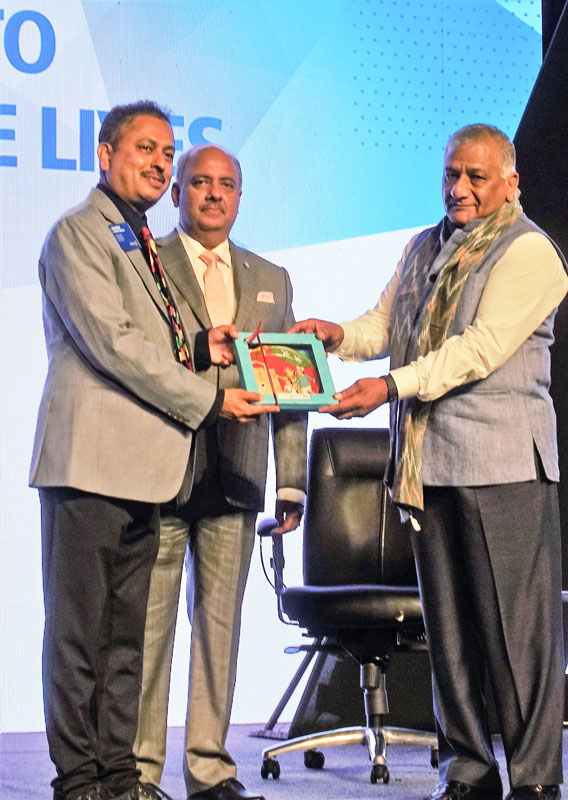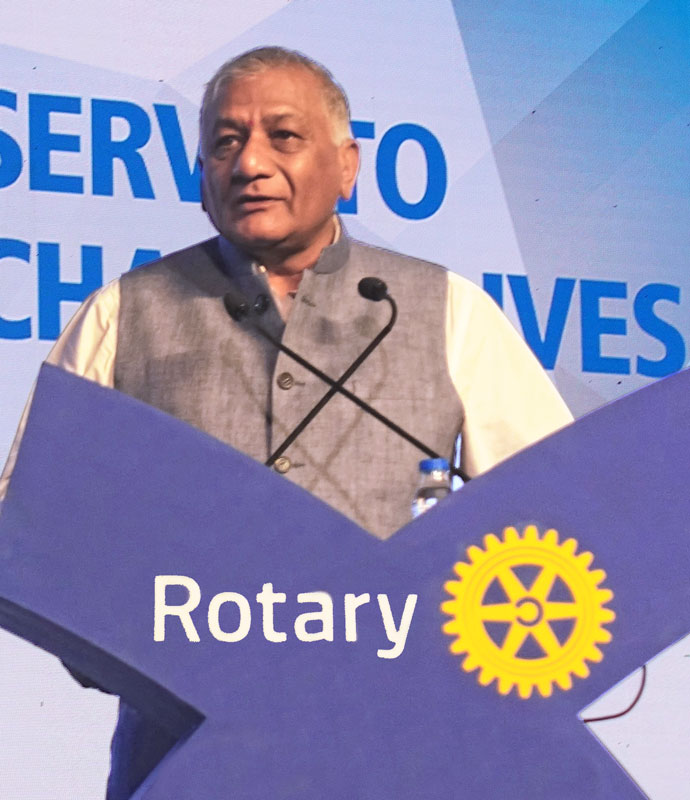
One of the popular speakers at the presidential peace conference in Hyderabad was former Army chief Gen V K Singh, Minister of State for Road Transport and Highways. Speaking on ‘Peace, the only solution’ he had words of high praise for Rotarians and their integrity, and said he had attended several Rotary meets and was aware of the work done by Rotarians in India. “Whenever you implement projects, the trust from the community comes because you are impartial, transparent and ensure things are done properly. Other NGOs can’t claim all this. It is something unique to Rotary culture.”
He made a particular mention of a Rotary project in Ghaziabad he was scheduled to attend, where over 2,000 bicycles would be distributed to girls attending government schools in that town. “I asked the Rotarians how they had identified the girl beneficiaries, and I was told that it took them almost a month to make a database and carry out a check to ensure that the right person was chosen to receive the bicycle. I was very impressed… this is akin to the background checks the Income Tax and revenue people carry out!”
Every society needed the right people to lead it in the right direction, he said. “As they say in the military, a pack of sheep led by a lion will act as a lion, and vice-versa. As you return home, take the message that you have the good luck to be a Rotarian, and hence can lead the community in the right direction.” If Rotary could do this, three-fourth of the country’s problems will be solved, in areas like poverty alleviation, giving the right skills and creating entrepreneurs to improve the wealth of the community.
“If you have a clear vision, things become simpler. Today there are so many opportunities in the world; a lot of time is wasted in pulling each other down; it is time to combine our strength and move forward. The day we do that we will be really able to march forward as a nation,” he added.
We have a unique characteristic. We will only move out when the shells are falling on us. We don’t listen to advisories, or any sane advice coming from parents and others.
Coming to India’s Armed Forces, Gen Singh asked: “What is the expectation that you have from the military and what does the military expects from you, we need to ponder.”
As somebody who had spent 32 years in the Indian Army “I can say proudly that Armed Forces are trained, geared and imbibed with the ethos to give their wholehearted sacrifice for the nation and its people. Do you know the Indian Army has the highest rate of officer casualties in the world? Pick up any military in the world; the fact is that the rate of officer to men casualties is the highest in India, and that is because officers of the Indian Army lead by example and are not scared to take bullets while defending their country.”
Referring to Rajya Sabha MP PDG Vivek Tankha, who was at the conference, the minister said: “I was talking to Vivek Tankha, who is like family to me… when I came into politics, people like him asked me how do you adjust to politics and I said if we can adjust from the deserts of Rajasthan to (the freezing tempertures in) Siachen, we can easily adjust to this environment. It is a different environment indeed, but if you are here to serve the people, then adjustment is not difficult.”
Referring to the violence and conflicts raging in our world today, Gen Singh said that “in all the conflagrations that take place one thing is certain, truth is the biggest casualty. Nobody is certain as there is so much of misinformation, propaganda and information war, so it is very difficult to take a right decision.”
Nevertheless, he said, in Ukraine, India was able to take out our students thanks to PM Narendra Modi talking to leaders on both sides, and ensuring an effective evacuation. “I witnessed this in Yemen also, because he was able o talk to the king of Saudi Arabia to give us 2–3 hours every day, for our evacuation exercise, and we managed to bring back our people safely. As a nation if you maintain good relations with various countries, it helps to take out your countrymen from conflict zones.”
Indians were present in 193 countries, “and we also have a unique characteristic. We will only move out when the shells are falling on us. We don’t listen to advisories, or any sane advice coming from parents and others and act only at the last minute creating many difficulties.”
Chairing the session RI Director Mahesh Kotbagi said that Rotary had never believed in the “preaching of passive peace; instead we have championed the peace process by inspiring people to strive for sustainable peace. During several wars, whether in Sri Lanka or Afghanistan, Rotary was the only organisation which was allowed to do polio immunisation amidst conflict.”
It was a matter of deep concern that 70 million people in our world are affected by wars and internal strife, and “nearly half of the affected population is children. We in Rotary cannot accept this. The time has come to invest in in peace. Children make one-third of the world’s population and one in six children lives in extreme poverty. Six million children under the age of five die each year because of malnourishment. This is unacceptable.”
Kotbagi added that after long years of being in several NGOs, “and this one in particular, I realise that peace can never prevail without reaching everybody basic education, shelter and healthcare. Let us refuse to accept conflict as a way of life, and preach and practise peace by imparting education, shelter and basic healthcare.”
Rukmini Iyer, a Rotary Peace Fellow, conducted a panel discussion on peace beyond borders in which four Ambassadors to India — Alejandro Marin, (Cuba), Wael Md Hamed (Egypt), Fleming Raul Ramos (Paraguay) and Eleonora Dimitrova (Bulgaria) participated. She said peace was “really about creating a safe space within a conflict… can we create space for conflict in a way that can be worked through with dialogue, conversation and not through violence? We have to explore the possibility of fostering peace where civil society can step in as peacebuilders and conscious citizens.”
Pictures by Rasheeda Bhagat






